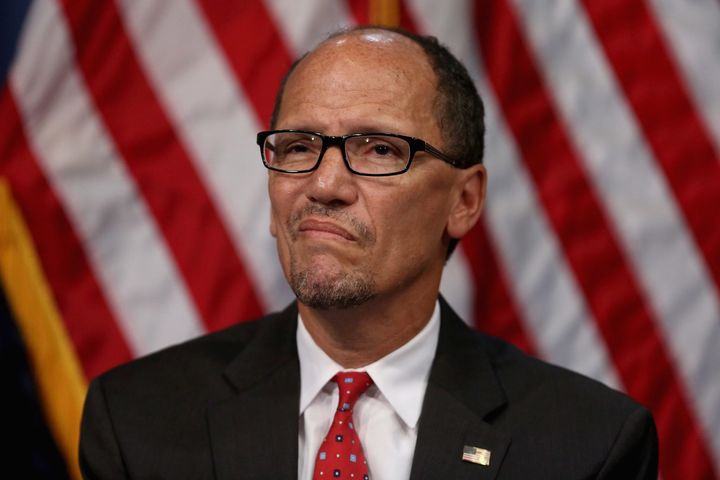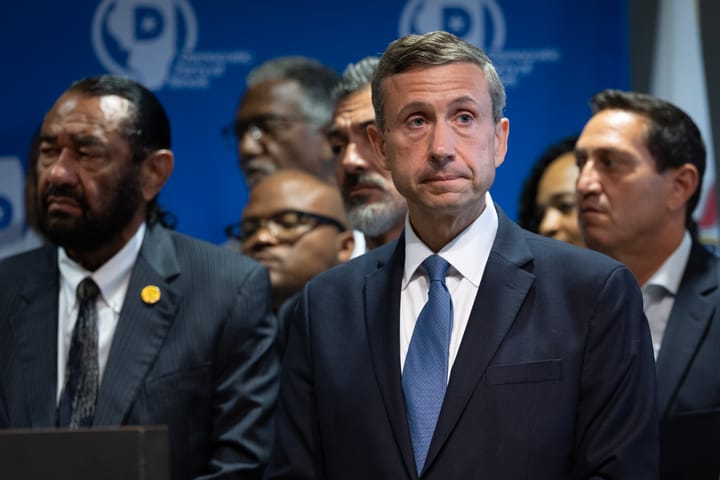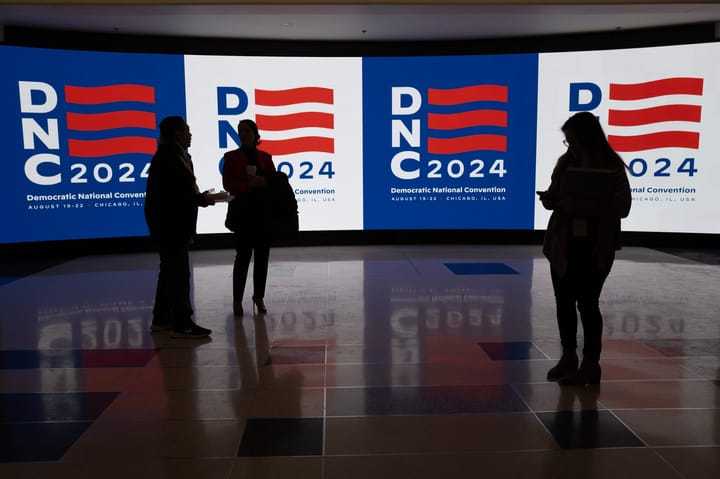It’s likely that going into the Democratic National Convention in July, none of the presidential candidates will have the outright majority of pledged delegates needed to secure the nomination on the first ballot. If that’s the case, Democratic National Committee members and other unelected superdelegates will be allowed to vote on a second ballot to choose the nominee.
Despite the pivotal role the DNC is likely to play in selecting who runs against President Trump, there is little public knowledge of who runs the party and who the superdelegates are.
Sludge has reviewed a full list of 447 voting DNC members as of August 2019 to create the first public profile of the members and their potential conflicts of interest from their work outside of the party. In this article—the first in a series—we look at the members of the Executive Committee, the DNC’s top governing body.
The Executive Committee, led by DNC Chairman Tom Perez and nine party officers, appoints the co-chairs and the majority of members on the DNC’s four standing committees: Rules and Bylaws, Budget and Finance, Credentials, and Resolutions. The committee also would decide whether to advance any proposed rule changes from the Convention Rules Committee, such as changes to the superdelegate voting process, to the standing Rules and Bylaws Committee for final approval.
Of the 47 Executive Committee members and DNC officers, Sludge found that 17 have backgrounds in promoting corporate interests: 13 are currently registered lobbyists for for-profit companies, principals at consulting firms with corporate clients, or corporate lawyers; three were corporate lobbyists or corporate lawyers in the last six years, and one was a corporate lobbyist in the past.
Several of the members of the Executive Committee were appointed by Perez in an October 2017 purge after his narrow election as chair and his picks did not require approval from other DNC members before joining the committee. The committee, which is tasked with meeting the most frequently of DNC bodies at four times per year, is also required by the bylaws “to keep a record of its proceedings which shall be available to the public,” though no minutes are made available online by the DNC. Several DNC members told Sludge they do not receive prior consultation from the chair regarding the committee’s agendas and decision process.
[Related: Corporate Lobbyists Control the Rules at the DNC]
The DNC does not make its membership available to the public; for this research, Sludge obtained a copy of the membership list from a DNC member. These lobbyists and consultants, as well as their corporate clients, stand to benefit from their power to decide which candidates the national party supports and, through their committee positions, how the DNC budget is allocated and which messages receive promotion.
Here are the party leaders with backgrounds in corporate lobbying and consulting who Tom Perez has appointed to king-making positions on the Executive Committee.
Tonio Burgos—DNC member from New Jersey
Burgos, who is also a member of the standing Committee on Budget and Finance and one of Perez’s nominees to the Convention Credentials Committee, is a prominent corporate lobbyist in New Jersey and New York with his firm of over 30 years, Tonio Burgos & Associates. In Albany, one of Burgos’ highest-profile clients has been the Fortune 500 oil and gas company Williams Companies, which paid Burgos’ firm nearly $1 million for lobbying from 2007 to 2016, according to the non-profit Public Accountability Initiative. Williams Companies has long sought to build a fracked-gas pipeline extending from New Jersey’s Raritan Bay under New York Harbor, a proposal actively opposed by the Stop The Williams Pipeline coalition of environmental groups. After serving as a top aide and appointments secretary for former New York Gov. Mario Cuomo, Burgos became a major donor to his son, current Gov. Andrew Cuomo, giving at least $85,800 personally to Andrew Cuomo’s campaigns and another $201,800 through his lobbying firm as of Aug. 2018, according to PAI.
In addition to past fossil fuel industry clients such as National Grid and NRG, Burgos’ 2018 New Jersey lobbying disclosure form lists clients including American Airlines and insurance company AIG. Over in New York, Burgos reported lobbying for dozens of clients, including Pfizer, EmblemHealth, and Verizon, in addition to the Tulsa-based Williams Companies.
Minyon Moore—at-large DNC member
Moore is a principal at public affairs and lobbying firm Dewey Square Group, where she “leads DSG’s State and Local Affairs and Multicultural Strategies practices with clients ranging from the Fortune 100 to startup non-profits seeking counsel.” DSG’s current clients include McDonald’s, Sony Pictures, and Lyft. Dewey Square Group has worked with multiple clients in the health insurance industry to block changes to Medicare Advantage that were needed to finance the Affordable Care Act, including an effort to place fake letters to the editor in local newspapers, according to a report from The Intercept, noted by Kevin Gosztola on Twitter. Moore is also a member of the standing Rules and Bylaws Committee and one of Perez’s nominees to the Convention Credentials Committee.
Jaime Harrison—DNC Counselor and Associate Chair
Harrison, the chair of the South Carolina Democratic Party from May 2013 to April 2017, is currently running as the Democratic nominee for U.S. Senate against Republican Sen. Lindsey Graham. From 2008 to November 2016, he was a principal at the Podesta Group, which at the time was run by Hillary Clinton bundler Tony Podesta, where his lobbying clients included Lockheed Martin, Wells Fargo, BP America, Merck, Bank of America, and others. One of his clients, American Coalition for Clean Coal Electricity, which represents coal companies like Murray Energy and Peabody Energy, fought against President Obama’s Clean Power plan and other climate-related regulations during the period in which Harrison was registered to lobby for them. In November 2016, Harrison told the Post and Courier, “It’s how I pay back the $160,000 of student loan debt. It’s how I pay the mortgage for my grandmother. And I’m proud of my work…”



